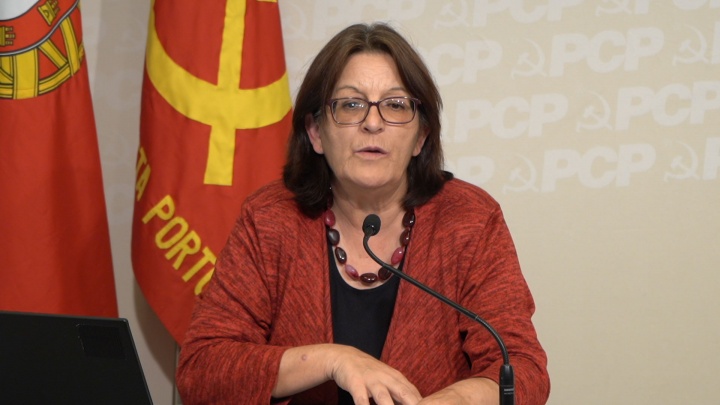1. The epidemic outbreak brought to the fore the situation and prospects of the social responses that make up the Network of Social Care Facilities and Services.
The suspension of the activity of some of these social responses - nurseries, pre-school, leisure activities, centres for occupational activities, day care and social centres, among others – was a measure to prevent the epidemic outbreak.
However, isolation is not free from social, emotional and psychological consequences for the process of socialisation and development of children, youth and adults with disabilities and for the quality of life of the elderly.
The PCP considers that the opening of these services must be programmed by the government in order to ensure the necessary conditions, accompanied by adequate information to foster the confidence of users and their families.
Noteworthy, however, are the increased demands on the social responses and the services that remain functioning, such as the Home Support Service, the Nursing Homes for the elderly, people with disabilities, children and youth.
We reiterate, therefore, our salutations to the workers of this social sector, who have been subjected to a double overload of work under particularly difficult conditions.
To the officials of the institutions that intervene in the Network within the scope of the Social Action of the Public Social Security System, we want to affirm that we are monitoring the situation, intervening with initiatives in the Assembly of the Republic that aim to meet the needs of users and their families, of the institutions and their workers .
The Network covers a vast universe of institutions, services and a large number of users and workers. However, the current situation shows, in its diversity, common denominators whose essential features predate the epidemic outbreak and which will tend to worsen if appropriate measures are not taken.
First and foremost, the worsening financial situation of many institutions. Not only because of the need to purchase protective equipment for users and workers, but also because of the reduction in monthly fees (and even the lack of payment) resulting from unemployment, cuts in wages and cuts in family incomes. In addition, in keeping with the payment of cooperation agreements for 2020, around 1300 social sector institutions had, in April, activated the simplified lay-off scheme.
It is worth remembering that before the epidemic outbreak, most institutions had financial results bordering on a “red” line, and even negative ones. However, there were also an insufficient number of workers to staff the various services, in addition to their very low pay level (60% of workers earning the National Minimum Wage).
The PCP considers that it is necessary, as a matter of urgency, to implement a set of measures that respond to old and new problems, those created by the outbreak and those that preceded it, to decisively contribute to raise working conditions and rights of workers in the social sector and the quality of services provided and which are inherent to the objectives of the various social responses.
For the PCP, the current situation demands urgent measures in which the following stand out:
–The increase and reinforcement of the Social Security teams so that there is an adequate monitoring of the needs that are placed on the institutions in the field of their financial, human and technical resources, and the establishment of criteria for the measures to overcome them;
–Free of charge nurseries and similar solutions, embodied in a bill tabled by the PCP that aims to materialise decisions adopted in this year's State Budget. A proposal by the PCP that has not yet been regulated by the government and that would allow, in the current school year, exemption for families from the 1st. income bracket and for the second child of the 2nd. bracket from paying monthly fees;
–The creation of a scheme of aid for families, as set out in the PCP's bill, which aims, in particular, to review the monthly fees of nurseries and pre-schooling so that they reflect the change in household income; the expansion of services covered by the cooperation agreements in the areas of childhood, creating equality criteria in the calculation of monthly fees for all children; the prohibition of cancelling enrolments and charging fees or fines for non-payment of monthly fees during this period. The rejection of these measures by the PS shows the insufficiency of the government's response to mitigate the difficulties faced by families, which may lead to many of them removing their children from these facilities;
–The creation of a scheme for the reinforcement of workers in social facilities and which aims, namely: the creation of a recruiting group to assume and accommodate the hiring of workers wherever there are needs to be met in the current context; the transition from fixed-term contracts to permanent contracts (full-time), aimed at providing the staff maps with the minimum number of workers required; and the guarantee of adequate training to perform the specific functions of the different services, as well as in work contexts of risk.
2. The PCP considers that measures of a conjunctural nature must be accompanied by new solutions that respond to structural problems that affect and condition the capacity of response by the Network of Social Care Facilities and Services, in the present and for the future.
Hence, the PCP defends the reinforcement of the central role of the public Social Security system, breaking with the process of unaccountability of the Social Action subsystem, so that it focuses and achieves its objectives.
The current network of social aid facilities and services is based on giving full responsibility to the IPSS (Private Institutions of Social Solidarity) in their management, based on public funding. However, there is an increase in inequalities between institutions, in financial terms, in the human and technical resources available to them, which are reflected in the differences in the quality of services provided.
This absence of responsibility by the State in the creation of a Public Network is evident in the expansion of the private business, in the deep inequalities in access to facilities and services of social care depending on the level of income and the region where one lives, as well as the enormous shortage of vacancies, of which nurseries and nursing homes are more visible examples.
At the same time, unlicensed establishments proliferate, with the complicity of successive governments, which push people into makeshift solutions, often under degrading conditions and, even then, with high costs for users and families.
It is essential to deepen the situation of the Homes (IPSS, public and private sector), taking into account their reality, in the context of the epidemic outbreak, but also in relation to problems that preceded it.
The current situation leads to unaffordable monthly fees for most elderly people whose income level excludes them from access to this social response or translates into heavy burdens for themselves or their families; to a sharp difference in the levels of quality of the service provided, both in terms of facilities and human and technical resources that have to support this social response.
It is essential to provide an adequate articulation of all social responses, whether in the situation of illness or dependence (home support, nursing homes, among others), but also those that respond to the needs of the heterogeneity of this social group. It necessarily has to guarantee the expansion of this network, starting from the public sector, and all social responses must constitute an important dimension of aging with rights and quality of life.
In addition, there is a need to carry out a careful assessment of the situation and future prospects with regard to homes for children and young people and the various social responses in the area of disabilities in order to overcome shortcomings and difficulties, and to extend these responses based on direct management by the State.
It is essential to define a relationship between the State and private institutions of social solidarity based on the enhancing of a model of cooperation that responds to the problems and shortages found, that ensures their complementary role (not less important) to the creation and development of a Public Network of Social Care Facilities and Services managed by the public sector.
The PCP emphasizes that in the current situation and in the prospects for the future of the network of social care facilities and services, organisations that defend the rights of retired people, pensioners and the elderly, of people with disabilities, as well as trade unions that represent workers in the social sector, should be called to participate.
At the same time, priority should be given to pre-schooling and as recognized in the Framework Law for Pre-school Education, as "the first stage of basic education in the process of lifelong education, complementing the educational action of the family, with which it should establish close cooperation, favouring the education and balanced development of the child, with a view to its full insertion in society as an autonomous, free and solidary being”.
It is necessary, as the PCP proposes, to create a Plan for the Expansion of free nurseries or similar solutions, ensuring they are free of charge for all children by 2023 (end of the legislature), with the provision of 100 thousand vacancies, and at the same time, this network should be planned and developed through the public sector.
We will continue to intervene through a Public Network of Social Care Facilities and Services that, in its different areas, is planned to correct social inequalities and regional asymmetries, which deepens the rights of users and the quality of social responses in the different areas, which values the professionals working in the social sector, in order to improve wages, professional careers, professions and rights defined in the labour regulations, focusing on improving the qualification of the service provided to users by promoting the training and professional qualification of workers in the social sector.




